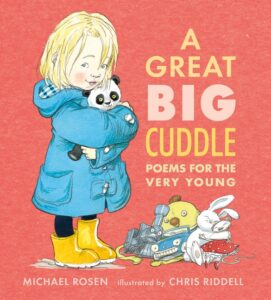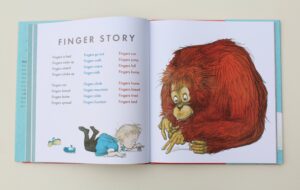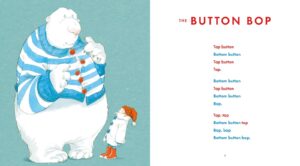Review of the Day: A Great Big Cuddle by Michael Rosen
 A Great Big Cuddle: Poems for the Very Young
A Great Big Cuddle: Poems for the Very Young
By Michael Rosen
Illustrated by Chris Riddell
Candlewick Press
$19.99
ISBN: 978076368116
Ages 0-4
On shelves now.
Did you know that, generally speaking, Europeans have absolutely no interest in the works of Dr. Seuss? It’s true. For years his works have been untranslatable (though great inroads have been made thanks to some recent Spanish editions) and those that remain in the original English have done very poorly in the United Kingdom. Americans by and large tend to be baffled by this. We look at the British lists of Best Picture Books and the like and find them Seuss-free zones. Abandon Seuss, all ye who enter here. I once asked an overseas friend if she’d ever heard of The Lorax. What she’d heard of was the abominable Danny DeVito movie. It doesn’t bear thinking about. Here in the States we rely heavily on Seuss because he was such a genius when it came to writing rhyming verse for the very youngest of readers. Now I hold in my hands a big, beautiful, thick collection of poetry for the very smallest of fry and I have to face an uncomfortable notion. If indeed the English are capable of producing books this good for kids this young, perhaps they don’t need any Seuss. With Rosen and Riddell pairing in this way, they seem perfectly capable of making remarkable, rhythmic, ridiculously catchy titles of their very own.
Thirty-five poems greet you. Thirty-five varying in complexity and content. Just to set the tone, the first rhyme is “Tippy-Tappy” and it contains such a catchy rhythm and happy beat that kids will be bouncing in tandem by the time it is done. Next is “The Button Bop”, limited in word count, high on bops. Accompanied by the vibrant watercolors of artist Chris Riddell, each poem aims to set itself apart from the pack. Some are short, and some slightly longer. Some are anxious or scared while others beat their chests and roar their loudest. It feels like there’s something for everyone in this collection, but the takeaway is how well it holds together. A treasure in a treasury.
Michael Rosen isn’t a household name in United States, but I’d say at least one of his books is. Anyone who has ever sought out or read We’re Going on a Bear Hunt, illustrated by Helen Oxenbury has read his words. We’re just nuts about that book, and we have him to thank for it. Despite that, he’s not an author to relegate himself to just one kind of story. Indeed, I haven’t seen him produce much of anything quite as young as “Bear Hunt” in years (or, at the very least, I haven’t seen works of his brought to U.S. shores this “young” in content). That’s why this book is such a surprise and a delight.
If you have a small child, you grow accustomed to the classic nursery rhymes. They have, after all, withstood the test of time. Still, roundabout the one hundred and fortieth time you’ve read “Bye, Baby Bunting” you long for something a little different. Imagine then the palpable sense of relief such a parent might feel when reading jaunty little poems like “What a Fandango!” starring (what else?) a mango. The thing about Rosen is that so many of his poems feel as if they’ve been in the canon of nursery rhymery for centuries. “Oh Dear” is very much in the same vein as “Hush, Little Baby” all thanks to its regular rhythm and repetition. “Party Time” counts down and brings to mind “This Old Man” in reverse. And should you be under the misbegotten understanding that writing poems of this sort is easy, go on. Write one yourself. Now fill a book with them. I’ll just wait right here and finish my sandwich.
 It is also worth noting that without including any verbal instructions, even the dullest of parental readers will catch on pretty early that many of these poems are interactive. Consider “Finger Story” where your fingers are instructed to do everything from “wake up” and “stretch” to “climb” and “slide”. And just in case they’re still not getting it, Chris Riddell’s art is on hand, showing a pudgy youngster and an orangutan of uncommon sweetness walking their fingers together on the ground.
It is also worth noting that without including any verbal instructions, even the dullest of parental readers will catch on pretty early that many of these poems are interactive. Consider “Finger Story” where your fingers are instructed to do everything from “wake up” and “stretch” to “climb” and “slide”. And just in case they’re still not getting it, Chris Riddell’s art is on hand, showing a pudgy youngster and an orangutan of uncommon sweetness walking their fingers together on the ground.
What is interesting to me here is that in terms of age of the reader, Rosen isn’t limiting himself solely to toddlers. There are a couple poems in here that preschoolers would probably appreciate more than their drooling, babbling brethren. “I Am Hungry”, for example, stars a hungry bear listing everything he could eat at this moment (both the usual fare and unusual selections like “A funny joke” or “The sound of yes”) ending with “Then I’ll eat me” which is just the right level of ridiculousness to amuse the canny four-year-old. And “Don’t Squash” is going to ramp up the silly levels pretty effectively when a splatter happy elephant is instructed not to squash her toes, nose, a bun, the sun, cars, stars, a fly, or the very sky.
Now just the slightest glance of a gander at the back bookflap of this book and you’ll get an eyeful of the sheer talent Rosen has been paired with over the years. His words have been brought to life by folks no less eminent than Helen Oxenbury, Quentin Blake, Bob Graham, and more. Truth be told, I don’t really know if this is his first book with Chris Riddell or not. I will say, though, that when I saw that Riddell was the artist on this title I was surprised. When last seen in the States, Riddell had illustrated that nobly intentioned but ultimately awful Russell Brand Pied Piper of Hamlin. Nothing against Riddell, of course, he did what he could with the material (Clockwork Orange Piper and all). So usually when I see his work I associate it with children’s books a bit more on the hardcore side of the equation. Neil Gaiman and Paul Stewart and the like. Could he do adorable? Could he dial back the disgusting? Yes, yes, and (for good measure) yes again. He has that thing we like to call in the business “talent”. Seems to suit him, it does.
Riddell also seems capable of occasionally re-interpreting Rosen’s rhymes with a particularly child-centric view. The poem “Are You Listening?” felt wildly familiar to me, for example. On the left-hand page sits a guilty dinosaur, slurping a piece of spaghetti, looking mildly nervous. On the right-hand page a toddler is berating a small dinosaur stuffed animal, and it will be very easy indeed for kids looking at the picture to extrapolate the relationship between the realistic dino on the left-hand page, and the one on the right. Sometimes I even got the impression that he was softening the content a tad. The poem “Winter” is one of splinters and blisters, but thanks to the gentle hand of Riddell it turns into a snuggly bear hug with mom. All this and he makes the book multicultural as well. Manifique.
 Is it very British? With an author from London and an artist from Brighton it runs the risk of indulging in a bit of English chicanery. There wasn’t much that struck me as containing a particular sense of humor, though, with the possible exception of the poem “Once”. A thoroughly silly but darker little work, it will probably remind Yankee readers more of Shel Silverstein than the aforementioned Seuss. There is also “Lost”, the story of a small mouse all alone, without any particular happy resolution in sight. Had such a poem appeared in a collection for small children originally in the States, I don’t think it’s ridiculous to think that an American editor would have gently nudged the author away from ending the poem with the somewhat dire, “I don’t know, I don’t know, anything at all. / I’m going to sit still now and just look at the wall.”
Is it very British? With an author from London and an artist from Brighton it runs the risk of indulging in a bit of English chicanery. There wasn’t much that struck me as containing a particular sense of humor, though, with the possible exception of the poem “Once”. A thoroughly silly but darker little work, it will probably remind Yankee readers more of Shel Silverstein than the aforementioned Seuss. There is also “Lost”, the story of a small mouse all alone, without any particular happy resolution in sight. Had such a poem appeared in a collection for small children originally in the States, I don’t think it’s ridiculous to think that an American editor would have gently nudged the author away from ending the poem with the somewhat dire, “I don’t know, I don’t know, anything at all. / I’m going to sit still now and just look at the wall.”
The least respected form of children’s literature in existence is poetry. It hasn’t any American Library Association awards it can win. It typically is remembered by teachers in April and then never thought of again. But nursery rhymes fare a bit better. Not every parent remembers to read them to their children, but a fair number try. Getting those same parents to read original works of poetry to their little kids can be trickier, so it helps if you package your book as a big, beautiful, lush and gorgeous gift book. Delightful to read aloud again and again (a good thing since I’m afraid you will have to, if only to please your rabid pint-sized audience) and lovely to the eye, Rosen and Riddell aim for the earliest of ages and end up creating a contemporary classic in the process. It may not be Seuss but you won’t miss him while you read it. A necessary purchase for any new parent. A required selection for libraries and bookstores everywhere. Or, as the book puts it, “Tippy-tappy / Tippy-tappy / Tap, tap, tap.”
On shelves now.
Source: Final copy sent from publisher for review.
Like This? Then Try:
- Over the Hills and Far Away, edited by Elizabeth Hammill
- Wee Rhymes: Baby’s First Poetry Book by Jane Yolen, ill. Jane Dyer
- Welcome, Baby! Baby Rhymes for Baby Times by Stephanie Calmenson, ill. Melissa Sweet
Interviews: Chris and Michael speak on the radio about the book. Many fine sketches are to be seen as well.
Videos:
The man himself. Repeatedly.
RELATED
The job outlook in 2030: Librarians will be in demand
The job outlook in 2030: Librarians will be in demand
ALREADY A SUBSCRIBER? LOG IN
We are currently offering this content for free. Sign up now to activate your personal profile, where you can save articles for future viewing






Add Comment :-
Be the first reader to comment.
Comment Policy:
Comment should not be empty !!!